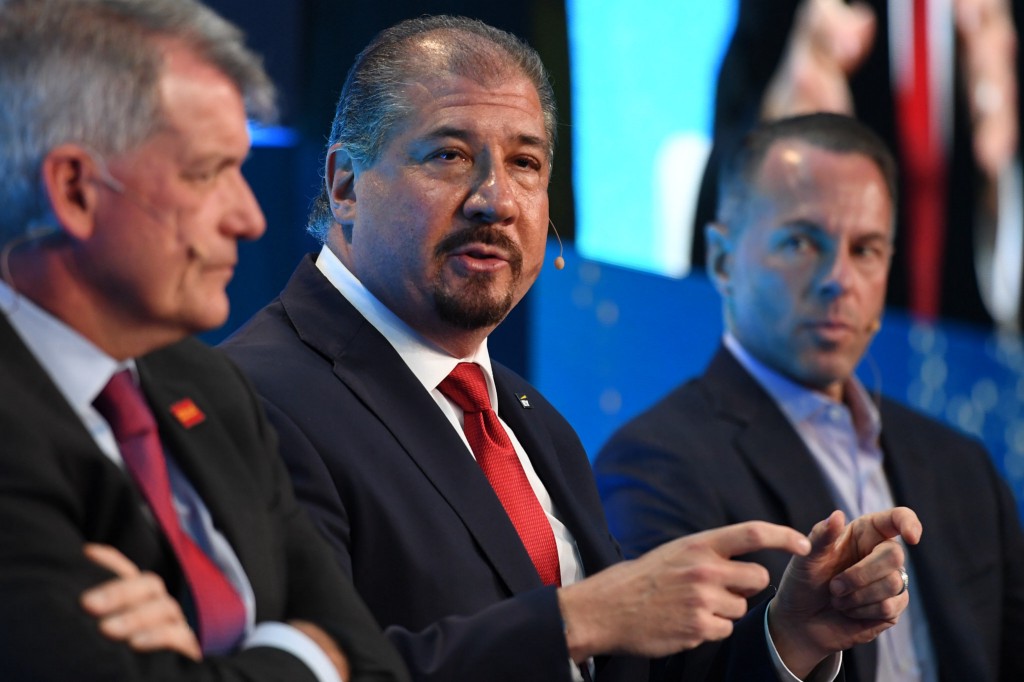The $12,500 ticket (at the low-end) kept away most customers, workers, citizens and millennials. But such stakeholders were on the minds, or at least the lips, of the heavily male global financiers and power brokers “at Milken” in Beverly Hills this week.
The customer / worker / citizen / millennial / female ferment for free speech, healthy products, better jobs, ethical companies — and impact investments — is driving the conversation at the Global Conference. It’s almost as if business executives and investors now think it’s their ‘purpose’ to be part of the solutions to climate change, inequality and social exclusion. Are they for real?
Sustainable investments are sustainable.
“In my world, five percent is hard to come by,” says Scott Minerd, the chief investment officer for the $240 billion Guggenheim Partners. Minerd says the right sustainable investments such as renewable projects can offer “long, stable returns that meet our target objectives.”
Guggenheim is working with the World Wildlife Fund to build a “sustainability quotient” that can independently rate each Guggenheim investment on its environmental, social and governance risks and opportunities.
Vicki Full, the investment chief for the New York State Common Retirement Fund, the third largest pension fund in the U.S. with $178.6 billion in assets, is thinking long term. “We must make sure that in quest to generate present returns we’re not sacrificing future returns,” she said.
New York State Common was spooked by a report it commissioned that showed a significant portion of its portfolio was vulnerable to responses to and consequences of climate change (see, “New York Pension Fund Tips $3.5 Billion Toward “Low Carbon Future”). Full is pleased that divestment and regulation are no longer the only solutions. She cited proactive impact investment opportunities in affordable housing and at the intersection of clean and mobile tech in emerging markets.
Purpose is the new profit.
Or at least that’s the new PR approach. The CEOs of legacy financial and food companies, Wells Fargo and Campbell Soup, say defining and leaning on their companies’ “purpose” helps them attract and retain a millennial workforce. So did Ernst & Young CEO Mark Wienberger, whose staff numbers around 250,000. “Purpose is key. [Millennials] think differently. They want to do well and good.”
Devin Wenig, CEO of eBay, felt more comfortable in his company’s skin. “Purpose is most powerful when directly tied to the business,” said Wenig, who boasted on two different panels Monday that eBay has a million U.S. e-entrepreneurs that are exporting goods abroad and hiring at home. “Social impact is what we do.” Wenig called for a national moonshot to educate people for the [STEM] economy.
Athletes find their (influential) voice.
Athletes are investing, giving and advocating to address racial, gender and economic challenges despite fears of losing their job and sponsors.
Anquan Boldin, wide receiver for the Detroit Lions, has set up the Anquan Boldin Foundation, traveled with Oxfam to drought-ravaged Ethiopia, and helped the organization get a hearing before Congress where he testified. After his cousin was killed by an off-duty cop, Boldin took on criminal justice reform.
“I could no longer sit on the sidelines,” said Boldin.
Swin Cash, Olympian and three-time WNBA champion, whose Cash Building Blocks renovates and offers homes to low-income families, said criminal justice issues are real for many athletes. “Race violence is real and happens everyday.” Cash now works with the NBA’s social responsibility programs to engage fans with ways they can help.
Miami Dolphins’ owner Stephen Ross, who said the team’s 2014 bullying scandal was about race, has set up the Ross Initiative in Sports for Equality, or RISE, to use sports to address racism. “Sports is the one area today where there really is equality,” said Ross, who has brought in the heads of the NFL, NBA, MLB, NHL and other sports leagues as well as media executives to help mobilize action against racism. “It is the common denominator in the world.”
Troy Vincent, a former NFL star now in charge of player engagement for the league, said “Millennials are speaking out — the young people are telling us where they want us to be,” on social justice issues.
See more of ImpactAlpha’s coverage of the 2017 Milken Institute Global Conference:











